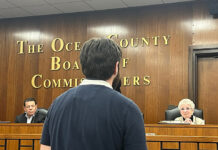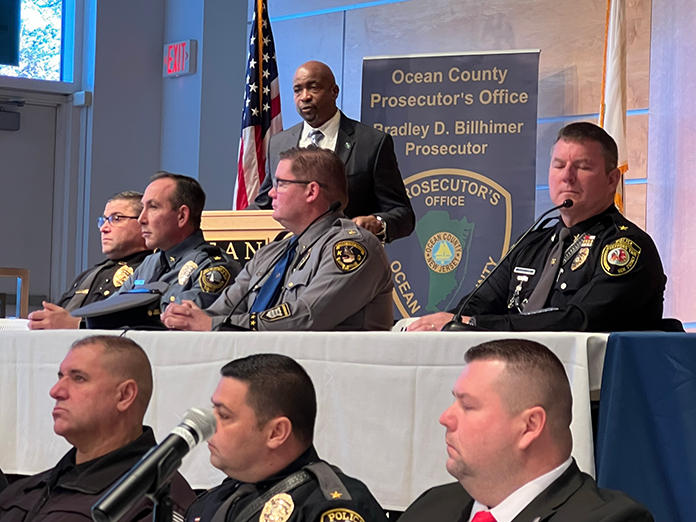
TOMS RIVER – Before a gathering of residents and police officers, Ocean County Prosecutor Bradley D. Billhimer told the crowd with a solid assurance that none of the other top police brass assembled with him planned to defend the indefensible.
Billhimer wasn’t alone when he first witnessed the graphic footage of Memphis police officers pummeling away at Tyre Nichols pulled over for a traffic stop. The brutal beating of the 29-year-old Black man claimed his life three days later.
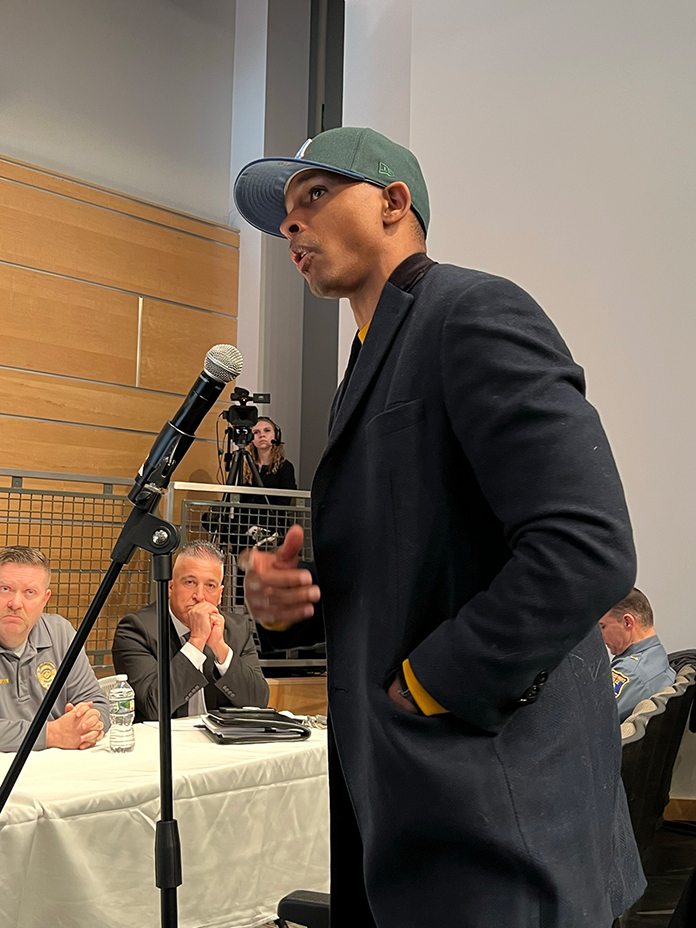
While sitting at home with his two teenage daughters and watching the horrific events unfold, Billhimer felt their emotional response. The younger of the two girls became so distraught she fled the room before even the worst of the videos appeared on the screen.
Ocean County’s chief law enforcement officer said he couldn’t begin to justify the lack of humanity he witnessed. Just about simultaneously, Billhimer took in an additional picture from another father’s perspective.
Anthony “Tony” Carrington serves as the Ocean County Prosecutor’s Chief of Detectives. Billhimer and his chief exchanged text messages as they witnessed the first release of the body cam footage.
The following day the two connected by telephone – after Billhimer suffered a restless night of sleep, spurred further by the haunting acknowledgment that a traffic stop could be a life or death situation for a Black person.
“I could tell from our text exchange the night before this affected him (Carrington) in a different way than it affected me,” shared Billhimer. “It affected him as a Black man, as a father, and as a Black man in law enforcement. He felt a certain way that I can’t necessarily 100 percent relate to because I’m not a Black man.”
Billhimer decided to fast-track a candid conversation with community members and faith leaders. The prosecutor credited several individuals for a six day turnaround in arranging the two-hour Town Hall style forum at Ocean County College.
The room’s set up was purposeful; Billhimer wanted the public and law enforcement to have a conversation while looking one another in the eyes.
Police leadership from all 33 Ocean County municipalities attended, as well as heads of state and county law enforcement agencies. The state’s top law enforcement official, Attorney General Matthew J. Platkin, sat center stage amongst the others who pledged their lives to maintain law and order.
Carrington was one of two Black men representing law enforcement at the head tables. Weldon Powell, who serves as the Chief of Detectives for the NJ Division of Criminal Justice was the other.
Both men acknowledged that working in law enforcement didn’t overshadow their concerns when it came to their roles as Black fathers.
Powell recalled the time his college aged son decided to go to the park and take some photographs. Sometime after, Powell’s son called to say his car wouldn’t start, and the Chief set out to meet him.
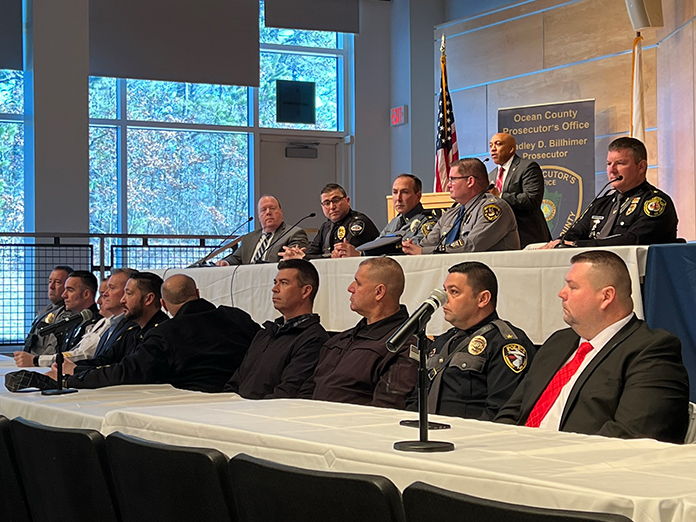
When he didn’t come across the car, Powell called his son back to determine a more exact location. His heart began beating faster when his son told him he was back down off the path in the park. As a father, Powell worried that his son had taken the car off road and someone would think he was doing something illegal.
“I’m thinking that if someone was thinking he’s up to no good,” Powell said. “Something’s going to happen.”
His heart rate intensified when Powell located his son and the car. A police car had arrived on the scene.
“When I got out of the car, the officer walked up to me and said he thought it was just the car’s battery,” shared Powell. “My heart stopped pounding as I realized the officer was more geared towards service than suspicion on that day.”
Carrington said the incident in Memphis really moved him as the father of three sons, two of whom have careers in law enforcement.
“These were just street thugs in a police uniform,” Carrington said. “It doesn’t matter what level of training you have, there’s a level of humanity…You don’t need to go through a police academy to know you don’t stand a young man up and restrain and beat him until he has no life in him.”
The Attorney General was the first to review some of the reforms put into place in New Jersey. Many came in the wake of the murder of George Floyd, another death that left the nation senseless.
“Law enforcement is obligated to value and preserve human life,” stressed Plotkin. “That’s the premise of our use of force procedures.”
According to Plotkin, New Jersey also plans to implement the strongest police licensing programs in the country. Surprisingly, the state is one of only a handful of other states that don’t currently license individual law enforcement officials.
Bystander intervention and de-escalation training represent another critical aspect of the state’s attempts to facilitate good policing.
“We launched a program that I’m working to bring statewide in the not too distant future that pairs mental health professionals with law enforcement officers,” Plotkin said, “Building on the great work done in our communities like Stafford Township under Chief (Thomas) Dellane.”
The program has resulted in the diversion of people to mental health care rather than getting arrested or injured.
Dellane, who currently heads up the New Jersey Association of Chiefs of Police, said that he viewed trust as something developed through communication. He stressed the importance of officer training and touched upon one that really hit home in the wake of Tyre Nichols’ death.
The Active Bystandership for Law Enforcement (ABLE) project trains officers that it’s okay to step in if they notice another officer having a bad day.
“Let’s prevent other people from making mistakes,” explained Dellane. “Let’s have the courage to step in and do things.”
Keith Germain, Chief of Barnegat Police and President of the Ocean County Chief’s Association, said New Jersey ranks high when it comes to its use of force policies. However, Germain also acknowledged that didn’t mean that people weren’t confident that what happened in Memphis couldn’t happen here.
“If the people that we are responsible to protect are afraid when they see us,” Germain said. “We’re just not doing it right…we can say we have this program and that program. It doesn’t matter if the message isn’t getting delivered to the person receiving the service.”
Billhimer said that Ocean County law enforcement agencies have been making a strong push to increase diversity pursuant to a directive from the Attorney General’s office. The goal is to ensure the agencies reflect the communities they serve.
Recruitment efforts have been tenuous despite the search for qualified individuals. According to Plotkin, the data on demographics indicates there’s still a lot of work to be done when it comes to diversity in law enforcement.
“Despite what happened in Memphis, I don’t want to say that diversity in law enforcement doesn’t matter,” said Plotkin. “Because we know it does.”
Germain said part of the issue goes back to his original premise of delivering the message and making the community confident that being a police officer was not being part of a racist institution.
“If I were a Black man with a Black son or daughter and believed that this institution is full of these problems and intractable racism, the last place I’m going to steer my children is in law enforcement,” he said.
The idea of recruiting people of color involved changing the perception of law enforcement agencies as racist institutions.
One audience member disagreed with the concept that diversity had any role when it came to hiring police officers. The man, who said he grew up in Albania and was a Muslim, claimed he was “famous” and had worked for John Gotti.
“I’ve spent 20 years in prison because I did the wrong thing,” said the man. “I’ve been beat up as a white man by police. My son’s in jail.”
Rodney Coursey, a young Black man identified what he saw as an issue.
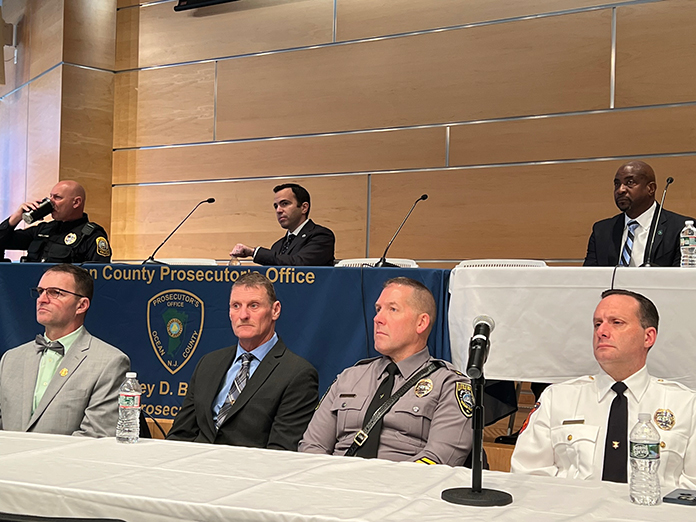
“The gentleman spoke about being a criminal,” Coursey said of the previous speaker. “A lot of these things happen to young brothers because of the stigma of the color of their skin. We’re talking about people who aren’t necessarily criminals who are being brutalized and victimized by law enforcement.”
Coursey also asked the members of the panel if they intended to engage in community policing. Plotkin said he believed that cops should be out interacting with residents outside of a context of a stop or arrest.
“I grew up in Lakewood basically my whole life and my relationship with law enforcement started when I was 10,” said Carrington. “I was 11 or 12 years old when the beat cop used to come by my house and joke with my dad. I can tell you 100 percent that I never had an adverse relationship with law enforcement – and that’s because there was communication. There was trust.”
Justin Jacobs of Toms River thanked the various law enforcement officials who acknowledged they had no idea what it was like to be a Black man. He figured he’d offer some personal insight as his voice shook with emotion.
“Five Black police officers were witnessed on camera beating another man,” said Jacobs. “You used the word inhumane – they were arrested and fired almost immediately.”
“Meanwhile, you have people like Chauvin, who knelt on someone’s neck for almost ten minutes,” continued Jacobs. “And, it takes months, almost years for anything to happen…so that’s the question, does this become the new template?”
Billhimer said he believed the action from Memphis top cops would become the new template. The public should expect law enforcement agencies to act quickly and swiftly, while also preserving the rights of the officers.
Jacobs confessed that he had a hard time trusting an organization he said was founded in racism by rich white people. He spoke of moments in history when Negros were rounded up for not “acting right.” Jacobs admitted he doesn’t want to experience fear if a police officer pulls him over.
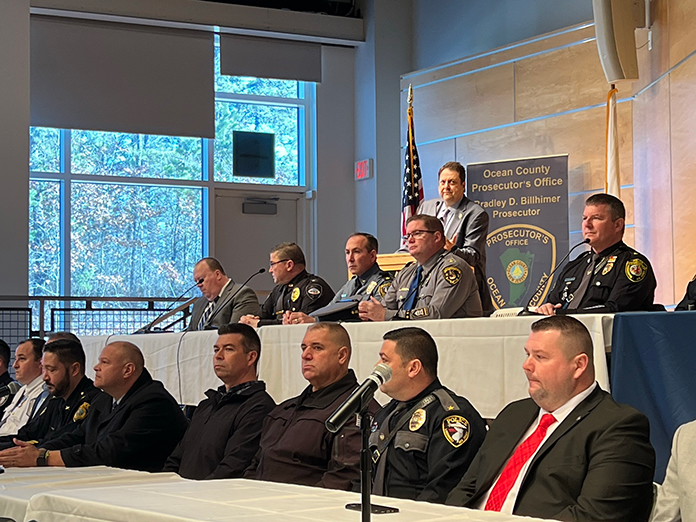
But the truth is – a traffic stop can put Jacobs in fears for his life.
Surf City Police Chief Jack Cassella had been nodding his head throughout much of the commentary from Black audience members who described their concerns about interacting with law enforcement. Jacobs’ revelations moved Cassella to the point he wanted to offer some reassurances.
“I think the problem is we’re trying to approach a problem that’s been around for a hundred years with a very complicated answer,” said Cassella. “I think the most easiest answer we can come to is officers approaching people should treat them humane. That’s my hope for law enforcement.”



